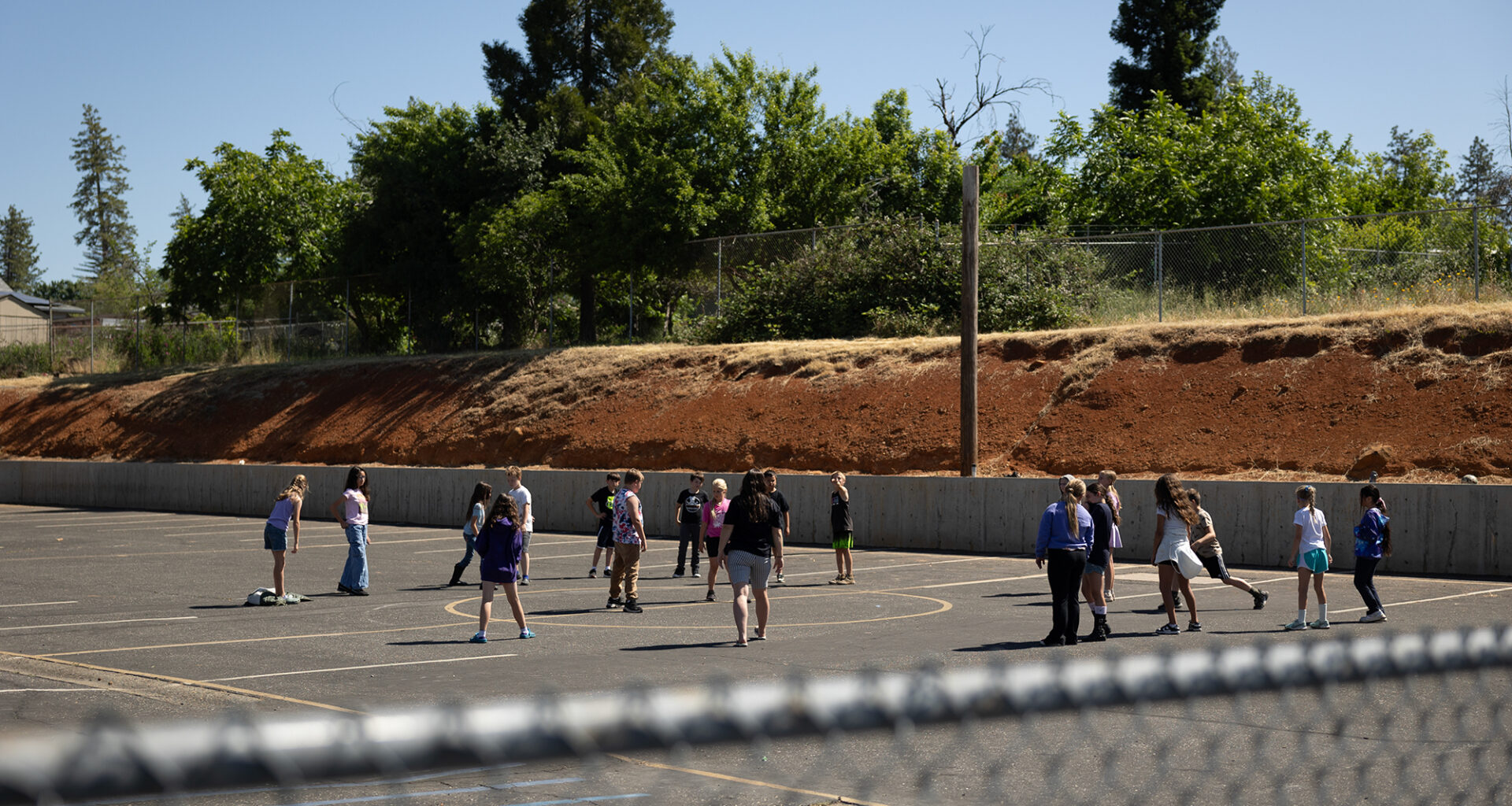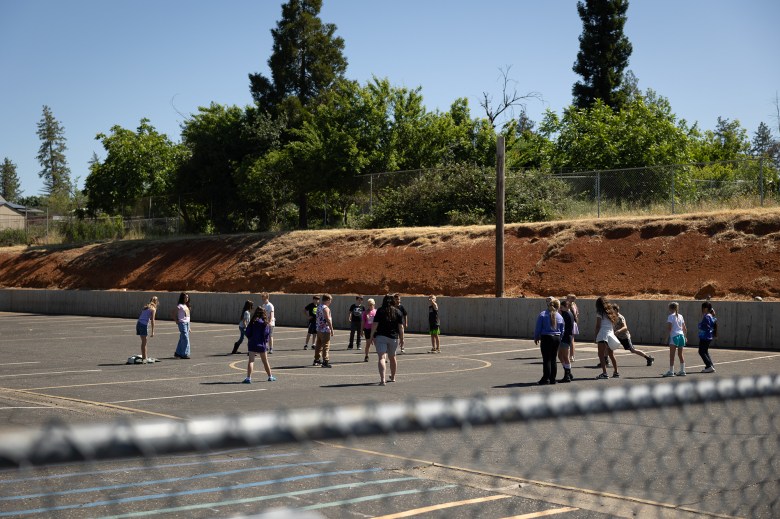 Students play on the playground at Achieve Charter School of Paradise in Paradise on May 21, 2025. Photo by Miguel Gutierrez Jr., CalMatters
Students play on the playground at Achieve Charter School of Paradise in Paradise on May 21, 2025. Photo by Miguel Gutierrez Jr., CalMatters
In the town that saw California’s deadliest wildfire seven years ago, a state-of-the-art elementary school is rising. It’ll have a STEM lab, soccer field and outdoor stage — manifestations of Paradise’s hopes for its future.
But while breaking ground and constructing a new 46,000-square-foot campus is one achievement, the road to recovery for the students of Paradise remains long, complex and difficult. It’s a hardship that is likely to become more common throughout the state as the threat of wildfires intensifies, writes CalMatters’ Carolyn Jones.
The 2018 Camp Fire killed 85 people, destroyed more than 18,000 buildings — including most of the town’s dozen schools — and displaced at least 26,000 people. In its aftermath, Paradise Unified reported 154 school closure days, which affected about 4,200 students, according to a CalMatters analysis.
Compounded by learning loss from the pandemic, only 13% of graduating seniors in Paradise Unified met the entrance requirements for California’s public universities last year or completed a career training program, compared with 45% statewide. Only 11% of eighth graders also met the state’s standard for math, and 18% of sixth graders were reading at grade level. District enrollment remains less than half what it was before the fire.
But in the wake of a catastrophe, stressing academic performance or attendance while prioritizing students’ mental health is a delicate balance: For most kids, anxiety and grief stemming from the Camp Fire has made focusing on schoolwork a monumental task. Teachers who lost their homes and now commute long distances have also struggled during the fallout of the wildfire.
Myah Poe, a recent graduate of HomeTech charter school in Paradise, lost her home to the fire. After living in motels and rentals with her family, she was able to return to Paradise two years ago.
Poe: “People see disasters on the news and they think, ‘Oh, that happened, it’ll be over after a year.’ It’s not. It stays with you for a long, long time.”
Focus on Inland Empire: Each Wednesday, CalMatters Inland Empire reporter Deborah Brennan surveys the big stories from that part of California. Read her newsletter and sign up here to receive it.
CalMatters events: Join us Sept. 24 in Sacramento for a special event celebrating CalMatters’ 10th anniversary and Dan Walters’ 50th year covering California politics. Hear directly from Dan as he reflects on five decades watching the Capitol. Plus, attendees can enter a raffle and win a private dinner with Dan. Members can use the code “MEMBER” at checkout for a discounted ticket. Register here.
Other Stories You Should Know
She bore her heart for mental health legislation
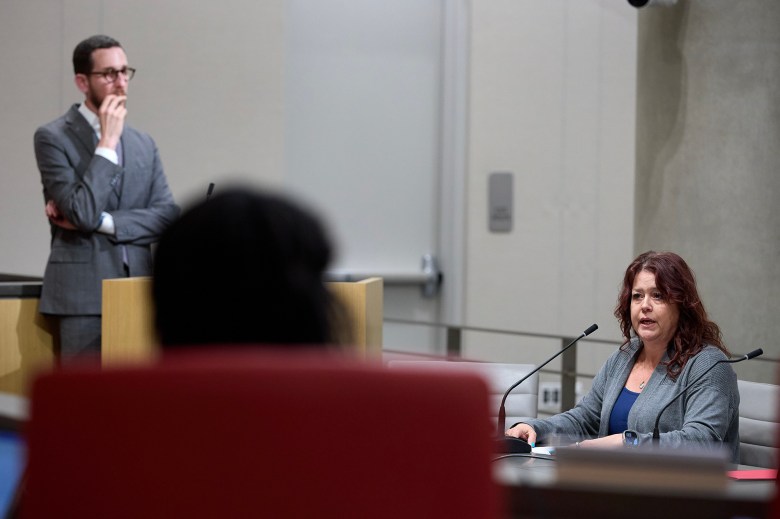 Christine Dougherty, right, testifies at the Senate Committee on Health at the Capitol Annex Swing Space in Sacramento on April 9, 2025. Photo by Fred Greaves for CalMatters
Christine Dougherty, right, testifies at the Senate Committee on Health at the Capitol Annex Swing Space in Sacramento on April 9, 2025. Photo by Fred Greaves for CalMatters
In the past few months, Christine Matlock Dougherty traveled more than 400 miles from her Yucaipa home in San Bernardino County to Sacramento on three separate occasions to advocate for two bills that would have regulated mental health insurance.
The measures failed to advance this year, but Dougherty pledges to press on in honor of her son, writes CalMatters’ Jocelyn Wiener.
Ryan Matlock died of a fentanyl overdose in 2021 after his insurance plan declined to continue covering his stay at an addiction treatment center. After speaking with CalMatters last year about her 23-year-old son’s passing, lawmakers asked her to testify on behalf of two bills to help prevent similar tragedies.
But in a tough budget year for the state, both bills were held in committees that oversee new spending. In the face of those legislative losses, however, Dougherty vows to continue her fight: “I will do it again. For Ryan.”
Intrigue over last-minute legislative deals
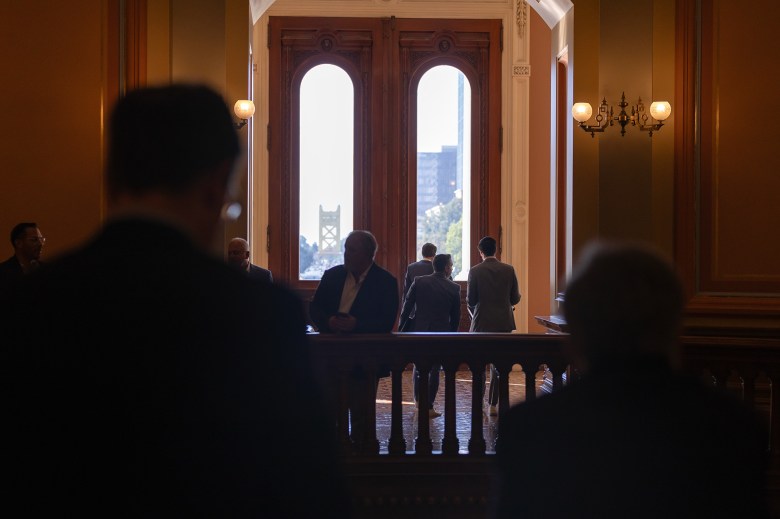 Advocates and lobbyists in the Capitol Rotunda at the state Capitol in Sacramento on Sept. 14, 2023. Photo by Rahul Lal for CalMatters
Advocates and lobbyists in the Capitol Rotunda at the state Capitol in Sacramento on Sept. 14, 2023. Photo by Rahul Lal for CalMatters
Though it’s not unusual for top leaders in California’s government to iron out legislative deals behind closed doors during the last days of session, this week is particularly notable because the fate of so many consequential bills is still up in the air, writes CalMatters’ Yue Stella Yu.
Before lawmakers adjourn Friday, Gov. Gavin Newsom, Democratic legislative leaders and their staff are working to make deals on whether to join a regional electricity market with other Western states; bolster the state’s wildfire funds; and increase California’s oil production. A $750 million loan for Bay Area public transit systems is also in limbo, with no clear resolution to date.
This lack of transparency is frustrating some lobbyists and advocates, who find themselves relying on draft bill language leaked to news outlets for information.
But withholding details about deals could help measures advance, since it allows lobbyists less time to object, said former Assembly Speaker Anthony Rendon, a Los Angeles Democrat.
Rendon: “Is that the best thing to do? Is that the most democratic thing to do? No. That’s the way our system works.”
And lastly: Extending CA’s cap-and-trade program?
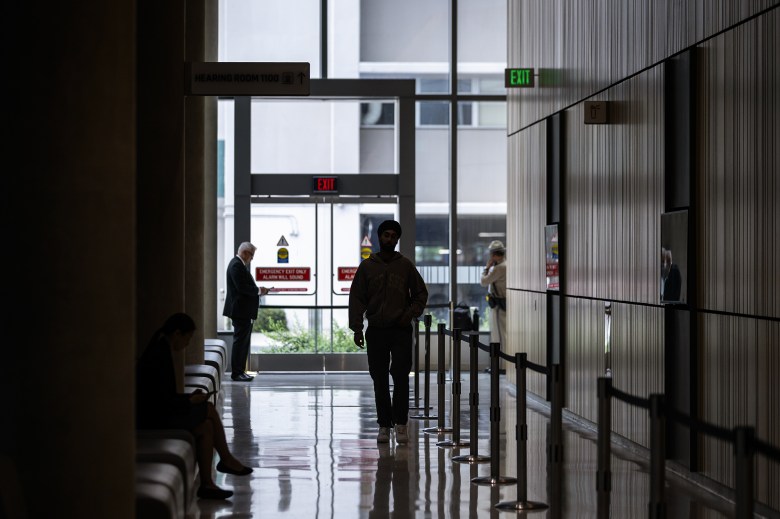 A hallway towards the Assembly Appropriations Committee at the state Capitol in Sacramento on Sept. 1, 2023. Photo by Rahul Lal for CalMatters
A hallway towards the Assembly Appropriations Committee at the state Capitol in Sacramento on Sept. 1, 2023. Photo by Rahul Lal for CalMatters
Speaking of last-minute deals, representatives from the fossil fuels industry, business groups and the state’s trade unions are coming together to oppose the extension of California’s greenhouse gas emissions reductions program through 2045. It’s a move lawmakers are scrambling to hammer out by the end of this week. Read more from CalMatters’ Maya C. Miller.
California Voices
CalMatters columnist Dan Walters: Newsom’s snarky media war against President Donald Trump has successfully raised his national profile, but being an early frontrunner for 2028’s presidential race also pins a target on the governor’s back.
California cities and counties touting the need for “local control” have allowed coastal areas to build gilded walls around themselves, leading to a housing crisis that has produced untold human misery, writes Stan Oklobdzija, assistant professor at UC Riverside’s School of Public Policy.
Other things worth your time:
Newsom rebukes Trump’s ‘unhinged CA obsession’ in state address // The Guardian
State Sen. Cervantes accuses Sacramento police of retaliation over ‘egregious’ DUI arrest // Los Angeles Times
COVID hospitalizations in CA double as vaccine access tightens // San Francisco Chronicle
CA’s farm workforce is growing older // KQED
Voters promised domestic violence survivors free lawyers. SF didn’t follow through // The San Francisco Standard
Grove of giant sequoia trees burns in CA’s Sierra National Forest // AP News
Billions spent, miles to go: The story of CA’s failure to build high-speed rail // Grist
LA immigrants fear the worst as Supreme Court allows raids to resume // Los Angeles Times
An Orange County dog voted in multiple elections. Why that matters in bitter redistricting fight // LAist
